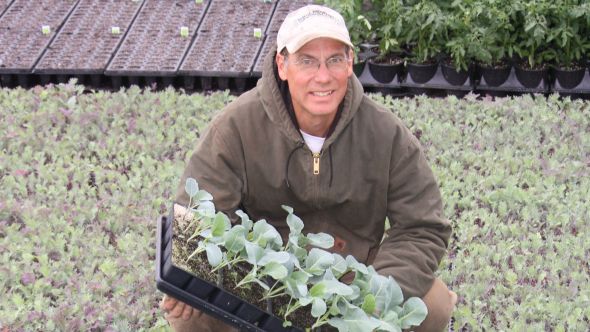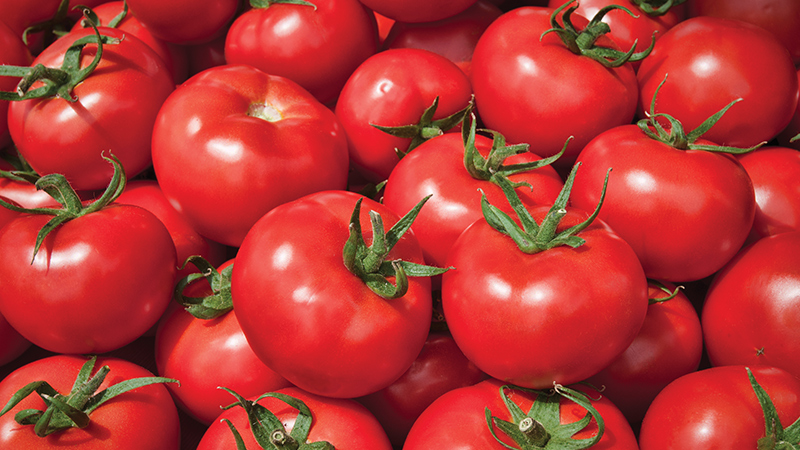Organic Vegetable Farm Combines The Right Ingredients To Create A Thriving Business

David Coveyou of Coveyou Farms in Petoskey, MI, produces certified organic vegetables including lettuce and other leafy greens,tomatoes, cucumbers, squash, and sweet corn. Photo credit: Coveyou Farms
David Coveyou, fifth-generation owner and operator of Coveyou Farms in Petoskey, MI, has landed on the perfect mix of ingredients that have made his business thrive in an increasingly challenging and competitive market.
An economical use of resources, key investments in technology, combined with top-notch production skills, have made his operation a success and an example for other growers to follow.
Coveyou Farms is certified organic and produces a variety of vegetables including lettuce and other leafy greens, tomatoes, cucumbers, squash, and sweet corn on a little more than 20 acres.
According to Coveyou, the farm tries to incorporate a wide range of crops into its offerings to cater to local markets.
“We have a seeding plan that [involves more than] 200 different vegetable varieties. That is a blessing and a challenge. We have a lot of variety because we don’t have a lot of markets that allow us to grow large volumes in our area,” Coveyou explains.
Choosing A Market
Local markets are the bread and butter for Coveyou Farms, and the operation distributes its produce through several channels including an on-farm market, farmers’ markets, a CSA program, and local restaurants, schools, and other institutions.
However, out of all of his markets, Coveyou says the on-farm market provides the greatest return.
“It’s the one I like the best, partly because of the major roadway we have, which leads into a tourist-focused community. The traffic that flows in provides us with a market that has the potential to really have staying power,” he explains.
Supplying organic produce to local markets has been Coveyou Farms’ primary focus for the last several years, but it hasn’t always been that way. Prior Coveyou generations based the operation on the farmer-to-farmer business model, selling primarily to wholesale markets. Things changed, however, when David Coveyou took over.
“It was kind of a given to get closer to the consumer and to sell directly to them. We decided to grow really high-quality products, and that’s where we move up the value chain,” he says.
The Case For Organic
Coveyou Farms was officially certified organic in 2014 yet had been producing organically for years. One of the primary reason for certification, he explains, was simply market demand.
“Our move to organic was driven by people who wanted and valued healthy and local produce. It was really the market that drove us toward certification. It’s a higher price point,” he says.
In addition to simple economics, Coveyou says a desire to challenge himself and to make sure soil and plant health hit optimal levels were other driving factors toward organic production. Practices like balancing the minerals in the soil, keeping up with soil testing, and adding amendments to bring up the microbiology have helped Coveyou’s plants get off to a good start and handle plant stress better.
“The organic fertilizers and minerals were actually providing better fertility late in the season than synthetics. And when I looked at how close [certified] organic practices were compared to what we were doing, it was really just a minor change to get certified,” Coveyou says.
However, producing organically in Michigan where the pest pressure can be high is not without its challenges.
“We do end up using some organically approved insect control sprays when needed. But for most crops it’s a secondary thing,” he explains. “When we spray, we’re usually spraying for some pest that would do significant enough damage to affect crop quality.”
Early To Market
The growing season in northern Michigan is shorter than in other parts of the country. As a result, Coveyou has adapted by planting ahead and being as early to market as possible.
The operation’s nine high tunnels and three greenhouses also help with earliness to market and, in fact, one of his three greenhouses has been transformed into a propagation house with a heated floor, which has allowed them to start germinating crops in the early spring.
The floor holds 2,000-plus trays of seedlings, and the temperature can be controlled on different parts of the floor, allowing them to propagate at cool or warm temperatures depending on plant needs.
“For us that’s enough transplant growing area to keep successive plantings going into the field, and it’s used all winter to grow salad greens maximizing the return on the geothermal floor capital investment,” Coveyou says.
The system also is highly cost efficient, he says, and has actually helped reduce production costs. The geothermal heating system the greenhouse uses replaced a cumbersome system that relied on electric heating pads. Plus, it allowed them to increase scale and decrease cost.
Long-Term Goals
Coveyou has made sure his facilities are well equipped to handle expansion and has designed his packing area with that intention in mind.
“The layout of the packinghouse features ergonomics to be able to have enough space, tables, and racking to support quite a large amount of produce,” he says.
Systems that are both scalable and long-term cost efficient will enable Coveyou to stay in business for a long time to come.
“We may have to put in a little more capital on things up front, but when things are up and operating, the costs are much lower. We need to do everything we can to decrease our operating costs,” he explains.
Looking ahead, Coveyou says he hopes to be more of a leader in the organic segment, continue to fine-tune his growing techniques, and be persistent with his search for more energy-efficient technology.
“I’m very impressed with the evolution in technology the last half-dozen years. Not just from an environmental standpoint — which is good — but also from an economic standpoint,” he says. “As more farms start looking into technology, they’ll find ways to cut costs and move to more energy-efficient systems.”









